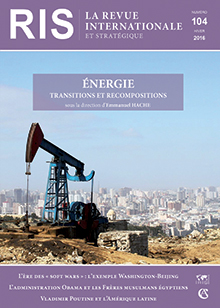Énergie et environnement
Décembre 2016
Middle East: clean energy sources and the diversification of the oil economies ? / By Giacomo Luciani
 Énergie : transitions et recompositions
Énergie : transitions et recompositions
RIS N°104 – Hiver 2016

After many years spent pressing the brake on climate negotiations, the major oil producers in the Gulf appear to have changed their strategy, accepting climate change as a serious threat which needs to be addressed. This has led to the formulation of what seems to be a complex strategy, which can be summarized in a set of five principles: This article explains these five guiding priorities in turn and discusses the geopolitical implications of the resulting change for the global posture of major ME producers. As always, a caveat is necessary: not all major Middle East oil producers are the same. The new tendency highlighted here is especially visible in Saudi Arabia and the United Arab Emirates (UAE), less so elsewhere. When it comes to Iran or Iraq, policies are driven by short-term, rather than strategic, preoccupations. One should therefore beware of generalisations, although the fact that Saudi Arabia is the main producer in the region, and necessary partner of any Organization
Cet article est en accès libre sur Cairn.


